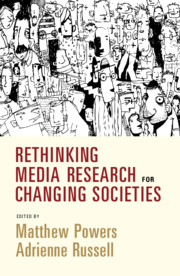Book contents
- Rethinking Media Research for Changing Societies
- Communication, Society and Politics
- Rethinking Media Research for Changing Societies
- Copyright page
- Contents
- Figure
- Contributors
- Acknowledgments
- 1 Introduction
- Part I Living in a Datafied World
- Part II Journalism in Times of Change
- Part III Media and Problems of Inclusion
- Part IV Engagement with and through Media
- Part V The Role of Scholars
- Other Books in the Series (continued from page ii)
- References
Part I - Living in a Datafied World
Published online by Cambridge University Press: 18 September 2020
- Rethinking Media Research for Changing Societies
- Communication, Society and Politics
- Rethinking Media Research for Changing Societies
- Copyright page
- Contents
- Figure
- Contributors
- Acknowledgments
- 1 Introduction
- Part I Living in a Datafied World
- Part II Journalism in Times of Change
- Part III Media and Problems of Inclusion
- Part IV Engagement with and through Media
- Part V The Role of Scholars
- Other Books in the Series (continued from page ii)
- References
Summary

- Type
- Chapter
- Information
- Rethinking Media Research for Changing Societies , pp. 25 - 50Publisher: Cambridge University PressPrint publication year: 2020



